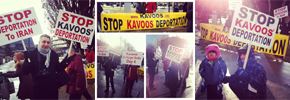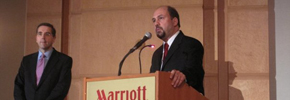Sima Sahar Zerehi – Doubletalk is nothing new in politics. We’re used to politicians saying one thing and doing the exact opposite. You can even argue that it’s a part of our political institution.
What would political news coverage be if it weren’t for the juicy bits of investigative reporting at the hands of zealous journalists with long memories and a desire to dig through archives, revealing how such and such politician voted this way while they had promised the exact opposite.
In the United States, hundreds of young political science students have found jobs in electoral campaigns as Opposition Researchers, donating their eyes and ears to scan though hours of audio and video material, social networking posts and newspaper archives to dish out dirt on their opponents who inevitably find themselves flip-flopping on issues.
While talking out of both sides of your mouth is a long cherished part of our political tradition, like anything else that enters our cultural framework, there are unwritten rules about how to contradict yourself in the political arena.
A rule of thumb is to have enough tact to wait until the public has forgotten your empty rhetoric before revealing the hypocrisy through your actions. It’s only polite to wait until the media cycle forgets about your slogans before you march in the opposite direction and negate everything you just said.
Unfortunately, when it comes to Iran, the Harper government seems to have forgotten their rulebooks on contradictory policies.
Earlier this month in a CBC interview with Peter Mansbridge, Prime Minister Harper painted a picture of the Iranian regime as a bunch of unpredictable, dangerous, fanatical, religious zealots who would stop at nothing to achieve their political objectives.
He stated, “I’ve watched and listened to what the leadership in the Iranian regime says, and it frightens me.”
The PM added, “In my judgment, these are people who have a particular, you know, a fanatically religious worldview, and their statements imply to me no hesitation about using nuclear weapons if they see them achieving their religious or political purposes. And … I think that’s what makes this regime in Iran particularly dangerous.
Echoing the PM, in an editorial published in the Globe and Mail, Minister of Foreign Affairs John Baird stated: “I agree with the Prime Minister’s assessment that a nuclear Iran presents the most significant and immediate threat to global peace and security. That is not rhetoric, that is reality.”
You would imagine that a government who sees the Iranian regime as a dangerous and unpredictable entity capable of unspeakable atrocities would not risk sending political activists into the hands of such a bloodthirsty clan.
After all, if Iran is able and willing to employ nuclear weapons to rid the world of the so-called Zionist threat then they are surely capable of causing unspeakable harm to individuals who defy them through their political activism.
The Harper government doesn’t have to go far to find examples of the Iranian government’s actions against individuals deemed to have defied them. In fact, we have a few “made-in-Canada” examples; take the murder of Iranian-Canadian photojournalist Zahra Kazemi in 2003.
Kazemi, a Montreal resident, had travelled to Iran to take photographs of demonstrations taking place in Tehran. She was issued a press card by the Iranian authorities to work as a photojournalist. Regardless, when she decided to take photographs of the family members outside Evin prison looking for information on the whereabouts of their loved ones she was arrested, interrogated, beaten, brutalized, raped and finally murdered by Iranian authorities.
This was not the only case where Iranian officials targeted an Iranian-Canadian. In 2008, the Iranian government singled out. Hamid Ghassemi-Shall. He was a Canadian citizen who had travelled from Toronto to visit his elderly mother in Tehran. While in Iran his brother Alborz an Iranian national was arrested, shortly afterwards Hamid was also seized by Iranian officials on May 24, 2008.
Hamid and Alborz were charged with espionage and contact with the Mojahedin-e Khalgh Organization. The evidence used against them was an email exchanged between the two brothers, which both deny having sent or received. For the first eight months in detention Hamid had no access to a lawyer or his family members and he was reported to have been subjected to torture.
Hamid and his brother were held in solitary confinement for 18 months until the end of November 2009 when they were transferred to a general population in Tehran’s Evin prison. Hamid’s brother passed away while still under custody before the commencement of his trial.
In the summer of 2009, the Revolutionary Courts convicted Hamid and sentenced him to death. Iran’s Supreme Court upheld the conviction and sentence in November 2009 and the Amnesty Commission in Iran rejected his appeal. Hamid was deprived of adequate legal representation, and denied the right to present a defense.
Hamid continues to languish in jail on death row. As Iran does not recognize dual citizenship, he is considered solely an Iranian national by the Islamic government; therefore he is not afforded Canadian consular access. As a result attempts by Canada’s Department of Foreign Affairs in Ottawa who have been monitoring the case and trying to work through diplomatic channels with Iranian authorities have come to no avail.
Saeed Malekpour a Canadian permanent resident is another victim of the Islamic regime’s witch-hunt against so-called dissidents.
Malekpour, a 36-year-old web developer had come to Canada with his wife in 2004 as a permanent resident. While in Canada he was freelancing to support himself and his wife who was attending graduate school.
In 2008 hearing about his father’s illness Malekpour travelled to Iran to be with his family. During his visit he was targeted by the Iranian government and arrested for committing alleged internet offenses.
Without his knowledge one of his photo uploading applications was used on a pornographic website.
In 2008 Malekpour was subjected to torture and a forced confession, which he later withdrew in a public letter explaining the circumstances of torture that had led to that confession.
In 2010 in a kangaroo trial, judge Moghiseh issued Malekpour’s initial death sentence for internet-related charges. In an appeal the Iranian Supreme Court reached the decision that the Canadian resident’s case file contained a list of discrepancies that judge Moghiseh needed to review and investigate before issuing a new sentence.
In a desperate move to finalize Malekpour’s death, Moghiseh reinstated the execution sentence in November 2011 during a trial that lasted only minutes. The discrepancies in the case were not addressed and no new investigation was launched.
Earlier this month the lead judge of the Iranian Supreme Court where Malekpour’s case file was being reviewed notified his lawyer via phone that they were able to confirm his death sentence despite the existing discrepancies under the charge of ‘Corruption on Earth.’
Malekpour’s lawyers described the Supreme Court’s voting process as “highly suspicious and illegal.” To date, nobody affiliated with Malekpour’s defense has been able to view his case file in its entirety.
Since his arrest, Malekpour has been held in solitary confinement at Iran’s Evin prison. Currently, he only has access to one two-minute phone call per week with his family, and a single family-visit per month. As part of this inhumane treatment Malekpour is blindfolded when taken outside.
Recent reports indicate that Malekpour has been subjected to new rounds of torture in an attempt to extract another forced confession from him. According to Maryam Nayeb Yazdi, one of the Toronto based organizers fighting on the campaign to free Malekpour, “These desperate attempts to extract a forced confession from Saeed are a response to the international pressure for his release. Clearly, the international pressure is working because the Iranian officials are desperate to legitimize their claim and prove his guilt.”
An international campaign has been mounted to free Malekpour including postcard campaigns, petitions, social networking campaigns as well as various demonstrations across Canada and the United States in cities such as Montreal, Los Angeles and Toronto.
Malekpour’s case is a classic example of how the Iranian regime is targeting individuals associated with online media as well as mainstream media in an attempt to stifle freedom of the press – these attempts have been escalated in the lead up to the March elections in Iran.
On January 29, 2012, Foreign Affairs Minister John Baird issued a statement about Malekpour’s case. He wrote, “Canada is deeply concerned about reports that Iranian citizen Saeed Malekpour’s death sentence has been confirmed by the Iranian authorities. His case is but one example of the refusal by Iranian authorities to respect their international human rights obligations.”
With such strong declarations and so much talk about the “Iran threat” from the Conservatives, you would think that the Harper government wouldn’t willingly throw another Iranian activist into the hands of the Iranian regime.
Yet that’s exactly what our Minister of Immigration, Jason Kenney, is preparing to do to photographer and human rights activist Kavoos Soofi.
Soofi who is a human rights activist involved with various groups in Iran came to Canada in 2004 on a student visa to study at York University. Following the expiration of his visa he applied for refugee status in 2006. His claim for asylum was refused in 2008. Fearing returning to Iran he submitted an application for a Pre-Removal Risk Assessment (PRRA) in 2009, which was rejected on January 11, 2012.
Since receiving the negative response to his PRAA on January 11, Soofi has been detained as a flight risk, first at the Immigration Detention Centre and later at the Metro West Detention Centre.
During his time in Canada, Soofi has escalated his involvement in various human rights and pro-democracy campaigns in opposition to the Iranian regime. He was an active participant in various anti-Iranian government demonstrations following the 2009 fraudulent Iranian elections. His photographs of these demonstrations as well as images of him as a participant in these events have been widely circulated on the internet.
Soofi’s activism was reflected on his Facebook page where he circulated numerous posts, photographs and statements in opposition to the Iranian regime.
As Soofi’s refugee claim and PRAA were filed prior to his activism in the post 2009 Iranian elections, his legal team has not yet had a chance to demonstrate the risk that he faces if returned to Iran. It is widely known that the Iranian regime routinely monitors online forums such as Facebook as a means of building cases against activists. In fact, most people who return to Iran are asked to open their Facebook accounts in the Iranian airport upon arrival. Under these circumstances Soofi is in real danger if deported to Iran.
Currently, Soofi is on the 10th day of a hunger strike in Metro West Detention Centre in Toronto while awaiting his February 7th deportation to Iran.
Soofi’s family and friends have mounted a campaign to stop his deportation which they say will likely result in his detention and torture at the hands of Iranian authorities. The Soofi campaign has included the gathering of hundreds of signatures on a petition to stop his deportation as well as various rallies, which have failed to gain enough media attention.
It seems bizarre that the Harper government, who seems adamant about showing the true danger of Iran to Canadians and the world, a government who has spoken publicly about the release of Malekpour and Ghassemi-Shall, would actively choose to send another person to face imprisonment and torture at the hands of the Iranian regime.
If Iran is the threat that Harper and Baird claim, then, it is surely not a place that can be entrusted with the safety and wellbeing of political asylum seekers. It’s time that the Canadian government puts their money where their mouth is, we need more than symbolic economic sanctions against Iran. We need a moratorium on deportation to torture, imprisonment and death.
For more information on the Kavoos Soofi campaign visit www.kavoos.org
For more information on the Saeed Malekpour campaign visit http://peoplewithoutnation.wordpress.com/
For more information on the Hamid Ghassemi-Shall campaign visit http://www.freehamid.org/







Harper is not interested in democracy or human rights but to serve those who helped him to get to post of prime minister; Iran and her leaders do not frighten him at all. He has been trying to promote Oil Sands over the past few years and he was demonizing Iran in that vein. Here are a few examples that show who truly Harper is.
۱. He has never talked about the plight of 1.5 million Palestinian people imprisoned in Gaza strip, an act that can be reconciled with any known laws, human or otherwise;
۲. As you were busy writing your article, Mr. Bair, Harper’s foreign minister was in Knnesset, Israeli parliament announcing that Israel has no better friend than Canada; Mr. Harper is trying compete with US in coming to the aid of Israeli government – a government that has no regards for international laws – all because of AIPAC North (Onex, CanWest, etc) donation to Mr. harper’s PC.
۴. Mr. Harpers action about the plight of native Canadian speaks volume about his concerns about human rights.
۵. His government not only refused but actively tried to prevented Mr. Abousefian Abdelrazik to leave the hellhole — that Canada thrown him in –in Sudan and come back to Canada
۶. I am sure that you know the story of Omar Khadr, the child soldier in Guantanamo Bay, and the help he got from Mr. Harper government
I can go on and on but I think you get the point.
Hope to see better work in future.